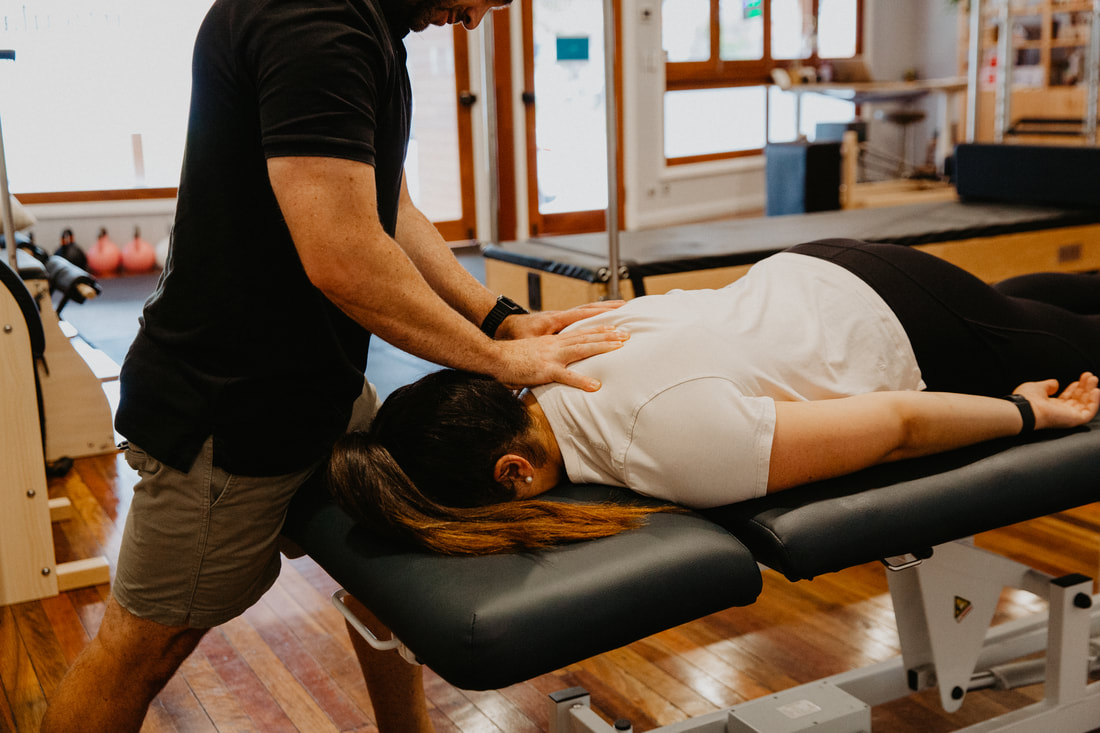Ankylosing Spondylitis Physiotherapy Brisbane southside.
What is Ankylosing Spondylitis (AS)?
Ankylosing spondylitis is a type of arthritis that primarily affects the spine and can lead to the fusion of the vertebrae over time. It belongs to a group of conditions known as spondyloarthritis, which involve inflammation of the joints and the places where ligaments and tendons attach to bone.
What are the symptoms of Ankylosing Spondylitis?
Common symptoms of ankylosing spondylitis include:
What causes Ankylosing Spondylitis?
The exact cause of ankylosing spondylitis is not fully understood, but it is believed to involve a combination of genetic and environmental factors. The HLA-B27 gene is strongly associated with AS, but not everyone with this gene develops the condition.
How is Ankylosing Spondylitis diagnosed?
Diagnosing AS typically involves a combination of medical history, physical examination, blood tests, and imaging studies (X-rays, MRI). HLA-B27 testing is often done to aid in diagnosis, but a positive result doesn't confirm AS, and a negative result doesn't rule it out.
What is the treatment for Ankylosing Spondylitis?
There is no cure for ankylosing spondylitis, but various treatments can help manage symptoms and improve quality of life. Treatment options include:
What is the prognosis for Ankylosing Spondylitis?
Ankylosing spondylitis is a lifelong condition, but its progression can vary greatly among individuals. With proper management and treatment, many people with AS can lead active and fulfilling lives.
How can physiotherapy help with Ankylosing Spondylitis?
Physiotherapy can play a crucial role in the management of Ankylosing Spondylitis (AS) by helping individuals maintain or improve their mobility, reduce pain, and enhance their overall quality of life. Here are ways in which physiotherapy can help with AS:
It's important for individuals with AS to work closely with a physiotherapist who has experience in treating the condition. The physiotherapist can collaborate with other members of the healthcare team, such as rheumatologists and occupational therapists, to provide a comprehensive approach to managing AS symptoms. The goal is to maintain or improve function, reduce pain, and enhance the overall quality of life for individuals living with Ankylosing Spondylitis.
If you or a loved one has questions about Ankylosing Spondylitis and how our physiotherapists might be able to help please call us on 07 3706 3407 or email [email protected]. We would love to work with you!
Ankylosing spondylitis is a type of arthritis that primarily affects the spine and can lead to the fusion of the vertebrae over time. It belongs to a group of conditions known as spondyloarthritis, which involve inflammation of the joints and the places where ligaments and tendons attach to bone.
What are the symptoms of Ankylosing Spondylitis?
Common symptoms of ankylosing spondylitis include:
- Back Pain: Persistent and often worsening pain in the lower back and buttocks, which can be worse during rest and improve with exercise.
- Stiffness: Morning stiffness and decreased flexibility in the spine and other affected joints.
- Fatigue: Feeling tired or fatigued, which can be a result of chronic pain and inflammation.
- Pain and Swelling: Pain and swelling in other joints such as hips, knees, and shoulders.
- Eye Inflammation: In some cases, eye inflammation (uveitis) can occur and cause eye pain, redness, and sensitivity to light.
- Difficulty Breathing: In severe cases, AS can affect the chest wall, leading to restricted lung function and difficulty breathing.
What causes Ankylosing Spondylitis?
The exact cause of ankylosing spondylitis is not fully understood, but it is believed to involve a combination of genetic and environmental factors. The HLA-B27 gene is strongly associated with AS, but not everyone with this gene develops the condition.
How is Ankylosing Spondylitis diagnosed?
Diagnosing AS typically involves a combination of medical history, physical examination, blood tests, and imaging studies (X-rays, MRI). HLA-B27 testing is often done to aid in diagnosis, but a positive result doesn't confirm AS, and a negative result doesn't rule it out.
What is the treatment for Ankylosing Spondylitis?
There is no cure for ankylosing spondylitis, but various treatments can help manage symptoms and improve quality of life. Treatment options include:
- Medications: Nonsteroidal anti-inflammatory drugs (NSAIDs), disease-modifying antirheumatic drugs (DMARDs), and biologics can help reduce pain and inflammation.
- Physical Therapy: Exercises and stretches to maintain or improve flexibility and posture.
- Surgery: In severe cases, surgery may be necessary to correct deformities or replace damaged joints.
What is the prognosis for Ankylosing Spondylitis?
Ankylosing spondylitis is a lifelong condition, but its progression can vary greatly among individuals. With proper management and treatment, many people with AS can lead active and fulfilling lives.
How can physiotherapy help with Ankylosing Spondylitis?
Physiotherapy can play a crucial role in the management of Ankylosing Spondylitis (AS) by helping individuals maintain or improve their mobility, reduce pain, and enhance their overall quality of life. Here are ways in which physiotherapy can help with AS:
- Pain Management: Physiotherapists can employ various techniques to alleviate pain associated with AS. These may include manual therapy, soft tissue mobilisation, and joint mobilisation techniques that can help reduce muscle tension and improve joint function.
- Posture Correction: AS can lead to changes in posture, such as a stooped or hunched forward position. Physiotherapists can work with individuals to improve their posture, which can reduce pain, enhance breathing capacity, and prevent deformities.
- Range of Motion Exercises: Physiotherapy focuses on maintaining and improving joint flexibility and range of motion. Stretching exercises can help prevent stiffness in the spine and other affected joints. Specialised exercises targeting the chest and ribcage can also improve chest expansion and lung function.
- Strengthening Exercises: Strengthening exercises for the core, back, and surrounding muscles can help stabilise the spine and improve overall strength. This can reduce the risk of injury and improve mobility.
- Breathing Exercises: In cases where AS affects the chest wall and lung function, physiotherapists may teach breathing exercises to help individuals maximise their lung capacity and improve respiratory function.
- Hydrotherapy: Water-based exercises in a warm pool can be beneficial for people with AS. The buoyancy of the water reduces the impact on joints while allowing for a wide range of motion. It can also help relax muscles and reduce pain.
- Education: Physiotherapists can educate individuals with AS about their condition, proper body mechanics, and strategies for managing their symptoms in daily life. This includes advice on ergonomics and how to avoid movements or activities that may exacerbate pain.
- Assistive Devices: Physiotherapists can recommend and teach the use of assistive devices like braces, orthotics, or mobility aids that may improve comfort and mobility.
- Individualised Treatment Plans: Physiotherapy programs are tailored to the individual needs of each patient. A physiotherapist will assess the severity of AS and create a customised exercise and treatment plan based on the specific symptoms and limitations of the patient.
- Monitoring Progress: Regular physiotherapy sessions allow for the monitoring of disease progression and the adjustment of treatment plans as needed.
It's important for individuals with AS to work closely with a physiotherapist who has experience in treating the condition. The physiotherapist can collaborate with other members of the healthcare team, such as rheumatologists and occupational therapists, to provide a comprehensive approach to managing AS symptoms. The goal is to maintain or improve function, reduce pain, and enhance the overall quality of life for individuals living with Ankylosing Spondylitis.
If you or a loved one has questions about Ankylosing Spondylitis and how our physiotherapists might be able to help please call us on 07 3706 3407 or email [email protected]. We would love to work with you!
Who to book in with:
Yulia Khasyanova
|
Emma Cameron
|
Mauricio Bara
|



